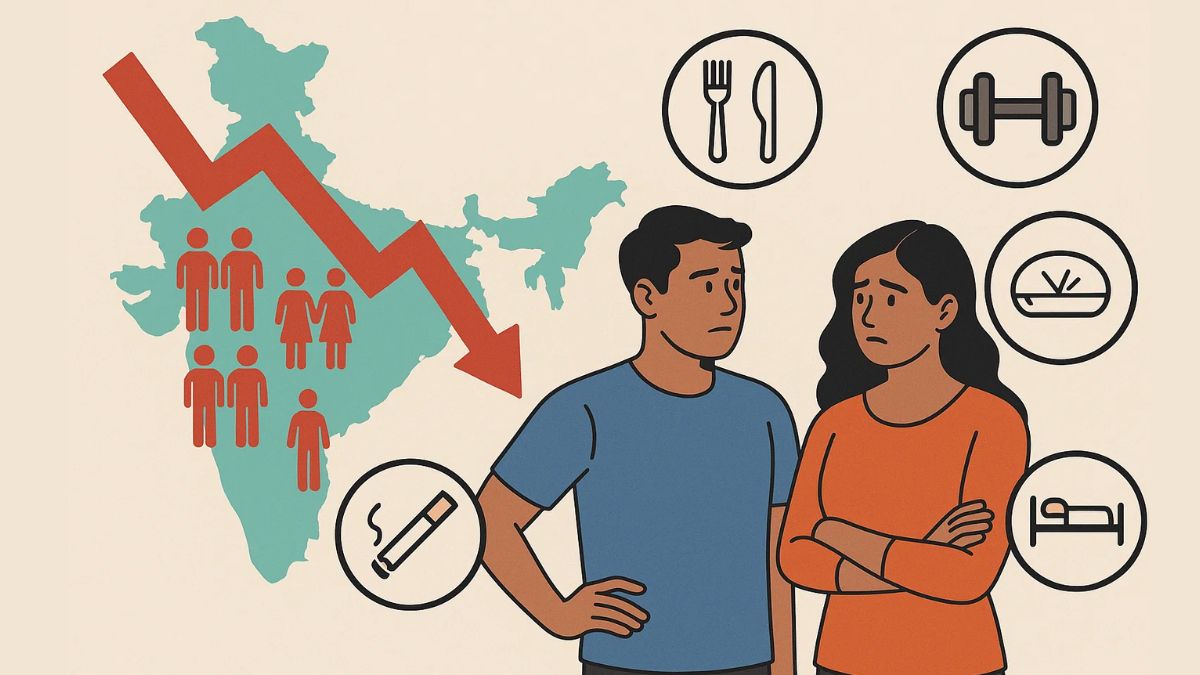While there are several reasons that play a role in an individual’s fertility, one major factor is their lifestyle. When you have an unhealthy lifestyle, it will likely impact your fertility level. Read on as doctors suggest lifestyle changes one should make to improve their reproductive health.
India’s fertility rate has dropped below the replacement level, which is 2.1. According to the United Nations Population Fund’s (UNFPA) State of World Population Report, India’s population has reached 1.46 billion in 2025; however, the total fertility rate (TFR) in India has fallen to 1.9. This is below the replacement level, which is needed to maintain a stable population across generations.
According to the National Family Health Survey of 2019–21, the TFR was recorded at 2.0, which is below the replacement level. A replacement level of 2.1 is required for a country to maintain its population. The report says, “This is the real crisis, not underpopulation or overpopulation. The answer lies in greater reproductive agency, a person’s ability to make free and informed choices about sex, contraception and starting a family.”
While there are several reasons that play a role in an individual’s fertility, one major factor is their lifestyle. When you have an unhealthy lifestyle, it is likely that it will affect your fertility level. Read on as doctors suggest lifestyle changes one should make to improve their reproductive health.
Dr Bindhu KS – Sr. Consultant Obstetrics, Gynaecology & Robotic Surgery at Apollo Hospitals Navi Mumbai says that in order to improve reproductive health, people need to make strategic lifestyle changes. Daily nutrition plays a foundational role in this. “Men and women need to eat foods rich in antioxidants, B-vitamins, omega-3 fatty acids and micronutrients like zinc and selenium. These are essential for hormonal regulation and ovulatory function. For men, they help with sperm health. However, urban diets nowadays are ultra-processed and nutrient-deficient, and thus lead to a loss in fertility levels.”
Dr Hina Shaikh, Consultant- Obstetrics & Gynaecology at Fortis Hiranandani Hospital, Vashi, says that being overweight can cause health issues like diabetes, hypertension etc., which can impact fertility; hence, maintaining a healthy weight and body mass index (BMI) within the healthy range is a key goal.
Besides diet, regular physical activity like aerobic exercise, strength training, or yoga, can boost hormonal balance and metabolic health. In women, it can help manage polycystic ovary syndrome (PCOS), a leading cause of infertility among Indian women.
Doctors also say that smoking is extremely harmful for both men and women as it damages the DNA in both eggs and sperm; hence, quitting smoking is the most powerful lifestyle change one can make. Alcohol consumption can also lower hormone levels and increase the risk of infertility; hence, it is ideal to avoid consuming alcohol.
Dr Amita Shah, Chairman & HOD-Obstetrics & Gynaecology at Manipal Hospital Gurugram, said that managing stress is also extremely important. These days, there is a lot of stress in people who are working in corporates and otherwise also. Stress management is one essential step that one has to take because stress leads to hormonal imbalances and fertility alterations.
One more very important aspect is quality sleep, which can definitely aid fertility levels. People should also avoid endocrine-disrupting chemicals like those found in plastics, cosmetics and polluted air. People should also engage in reproductive planning and regular medical check-ups. Of course, awareness and early intervention are key to reversing the downward trend.
Disclaimer: Tips and suggestions mentioned in the article are for general information purposes only and should not be construed as professional medical advice. Always consult your doctor or a dietician before starting any fitness programme or making any changes to your diet.


